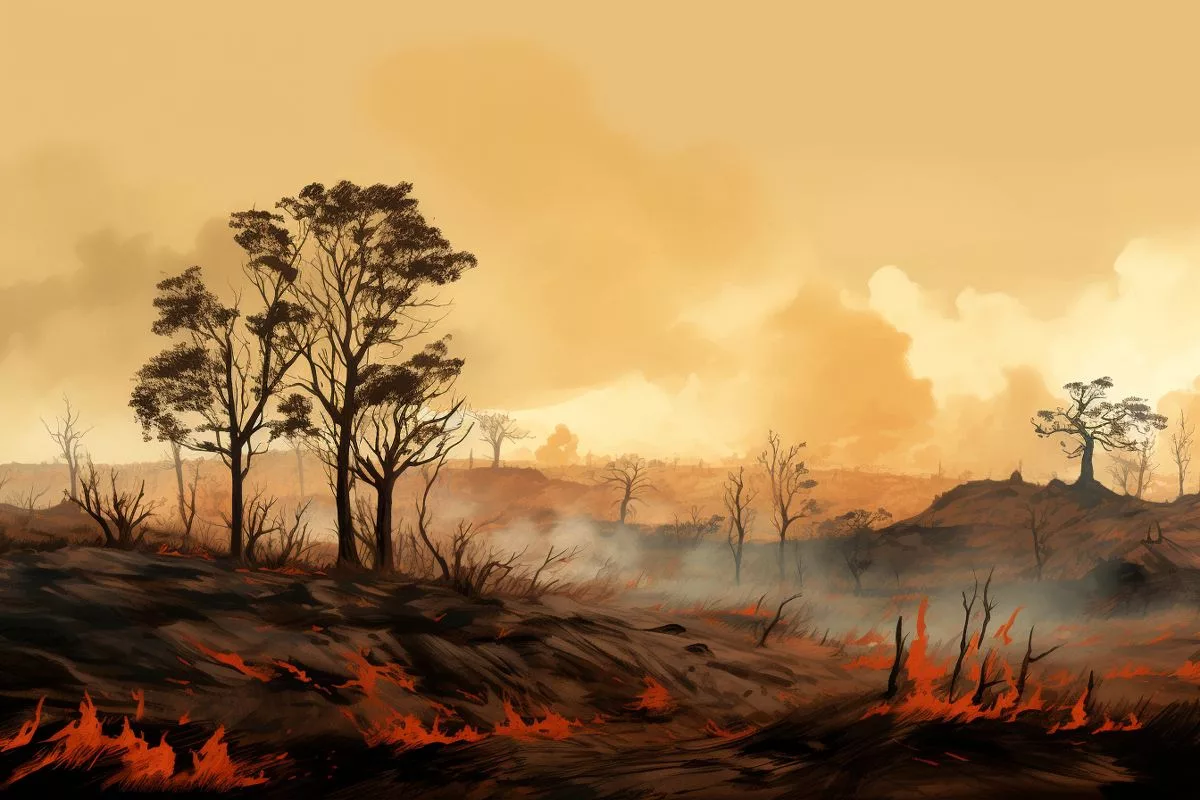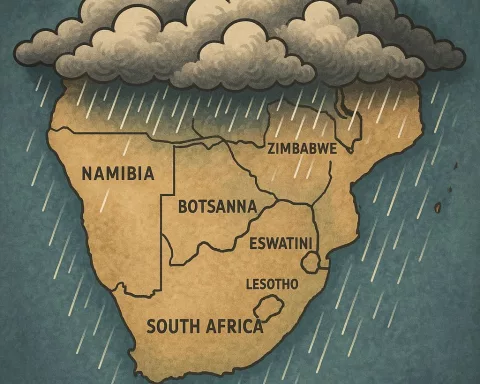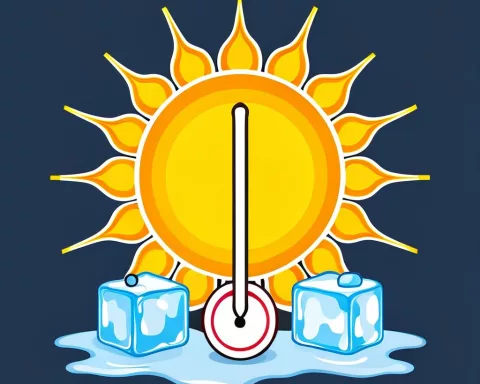South Africa is facing its worst fire season in a decade due to climate change and human activity. Fires are spreading beyond traditional areas and nearly 97% of regional fires are human-caused. While a damp winter may reduce the risk initially, global warming is expected to increase the frequency of conditions that support extreme wildfire behavior. Preventive measures include fuel reduction burns and constructing firebreaks, while individuals can create safe zones around their properties. This serves as a wake-up call for both the government and individuals to prioritize and invest in sustainable and adaptive strategies to minimize potential damages and safeguard our invaluable environment.
South Africa faces its worst fire season in a decade due to climate change and human activity. Fires are spreading beyond traditional areas, impacting the country’s economy and agricultural terrain. Nearly 97% of regional fires are human-caused, emphasizing the need for accountability. While a damp winter may reduce the risk initially, global warming is expected to increase the frequency of conditions that support extreme wildfire behavior. Preventive measures include fuel reduction burns and constructing firebreaks, while individuals can create safe zones around their properties.
Rising Threat of Fire Hazards in South Africa
South Africa is under the shadow of a potentially devastating fire threat this year, with specialists warning about the most severe fire season in the past ten years. Trevor Abrahams, the head of Working on Fire (WoF), signals a growing crisis, spurred by unexpected winter fires and the emergence of new danger zones in usually non-combustible areas. This alarming forecast highlights the growing risks posed by climate change and human activities, leaving a lasting impression on the nation’s social, economic, and environmental spheres.
The country’s northern region has already experienced a historic fire season, marked by an unexpected rise in both the frequency and severity of fires. The North West, typically affected by fires covering around 200,000 hectares, has been devastated by fires spreading over approximately 1.2 million hectares. This has caused four fire-related casualties, destruction of around 400,000 hectares of pastureland, and loss of cattle worth over R1 billion, as reported by Agri SA.
Abrahams points out an alarming pattern: the fires are extending into South Africa’s primary agricultural region. Traditionally, fires were limited to the northern forest regions and the Cape Fynbos areas. Currently, however, they are infiltrating into areas like Free State, North West, and Northern Cape. This transition is putting a significant burden on our economy and redefining South Africa’s agricultural terrain.
The Role of Human Activities and Climate Change
The fire season in the Western Cape was initiated with a fire in Peck’s Valley above Muizenberg. The exact cause of this fire is still unclear, but a local church group has confessed to starting a fire in that area. Anton Bredell, the Western Cape MEC for local government, environmental affairs, and development planning, discloses that nearly 97% of regional fires are triggered either deliberately or due to negligence. This disquieting statistic underlines the pivotal role of human accountability in preventing fires.
Despite the bleak prediction, there is a glimmer of hope. Stefaan Conradie, a climate study PhD student at the University of Cape Town, anticipates that the damp winter in the Western Cape may reduce the risk of extensive wildfires, at least at the beginning of the season. However, as global temperatures continue to rise, the likelihood of hot, dry, and windy conditions in the fynbos biome is expected to increase the frequency of weather conditions that support extreme wildfire behavior.
The Western Cape Government has allocated a total of R16 million for wildfire responses this year, marking an increase from last year’s budget of R14.5 million. Bredell asserts that this figure does not include the budgets of municipalities and other authorities. He also mentioned that around 2,300 firefighters, both professional and contracted, will be on duty this season, supported by aerial and ground resources including helicopters, fire-bombing planes, and spotter aircraft.
Preventive Measures and the Implication of the Fire Season
Regarding fire prevention tactics, Justin Buchman, the fire manager at Table Mountain National Park (TMNP), proposes a three-tier approach: controlled burning during the summer, fuel reduction burns during the winter – which comprise systematic burning of invasive plant species – and constructing firebreaks around the park’s boundaries and the urban periphery.
Colin Deiner, the chief director of Western Cape Disaster Management, stresses the significance of homeowners creating a safe zone around their properties by ensuring a secure distance between their houses and trees or bushes. Cape Nature also suggests other fire prevention practices such as maintaining short grass and thin vegetation around homes, storing gas cylinders securely away from heat sources, and keeping a fire extinguisher in a convenient location.
This forthcoming fire season draws a grim picture of a nation wrestling with the combined effects of climate change and human activities. It serves as a wake-up call for both the government and individuals to prioritize and invest in sustainable and adaptive strategies to minimize potential damages and safeguard our invaluable environment.
1. Why is South Africa facing its worst fire season in a decade?
South Africa is facing its worst fire season in a decade due to climate change and human activity. Fires are spreading beyond traditional areas and nearly 97% of regional fires are human-caused.
2. What are some preventive measures to combat the fire hazards in South Africa?
Preventive measures include fuel reduction burns and constructing firebreaks, while individuals can create safe zones around their properties. Controlled burning during the summer and fuel reduction burns during the winter are also recommended.
3. What is the role of human activities and climate change in the fire hazards?
Nearly 97% of regional fires are triggered either deliberately or due to negligence, emphasizing the need for accountability. As global temperatures continue to rise, the likelihood of hot, dry, and windy conditions is expected to increase the frequency of weather conditions that support extreme wildfire behavior.
4. What is the implication of the fire season in South Africa?
The fire season is impacting the country’s economy and agricultural terrain. It is putting a significant burden on the economy and redefining South Africa’s agricultural terrain.
5. What is the budget allocation and resources available for wildfire responses in South Africa?
The Western Cape Government has allocated a total of R16 million for wildfire responses this year, marking an increase from last year’s budget of R14.5 million. Around 2,300 firefighters, both professional and contracted, will be on duty this season, supported by aerial and ground resources including helicopters, fire-bombing planes, and spotter aircraft.
6. What are some fire prevention practices for homeowners in South Africa?
Homeowners should create a safe zone around their properties by ensuring a secure distance between their houses and trees or bushes. Other fire prevention practices include maintaining short grass and thin vegetation around homes, storing gas cylinders securely away from heat sources, and keeping a fire extinguisher in a convenient location.












